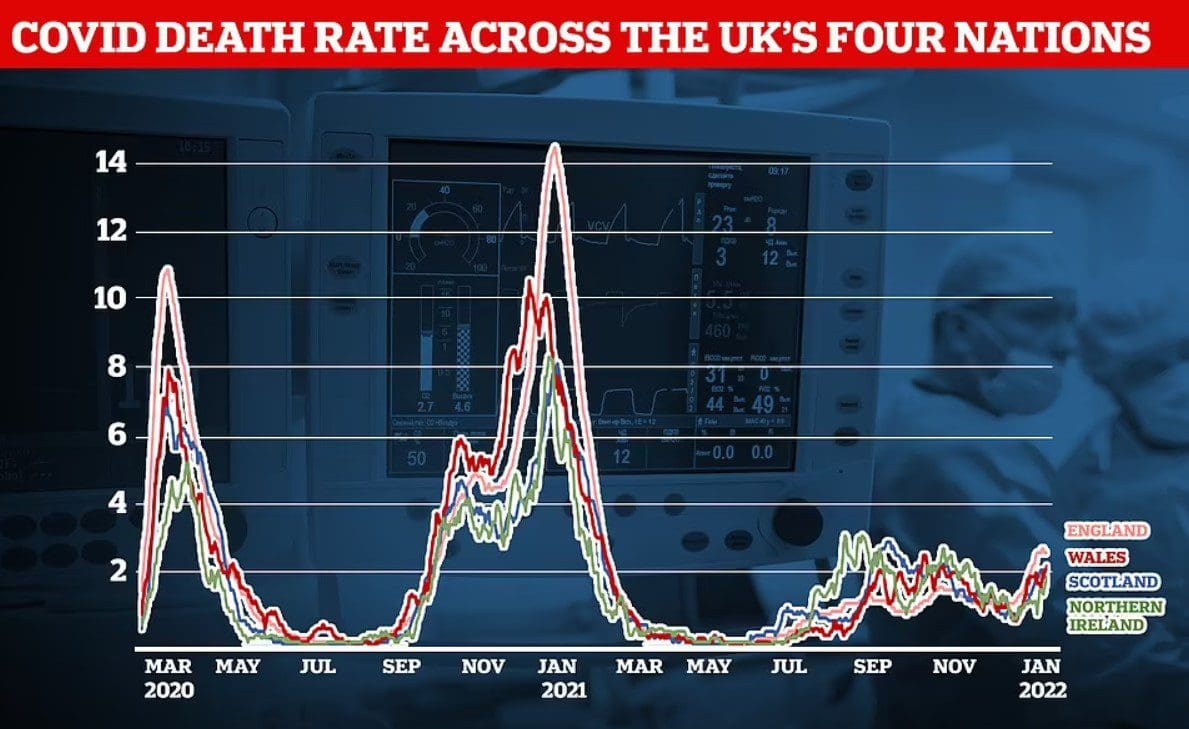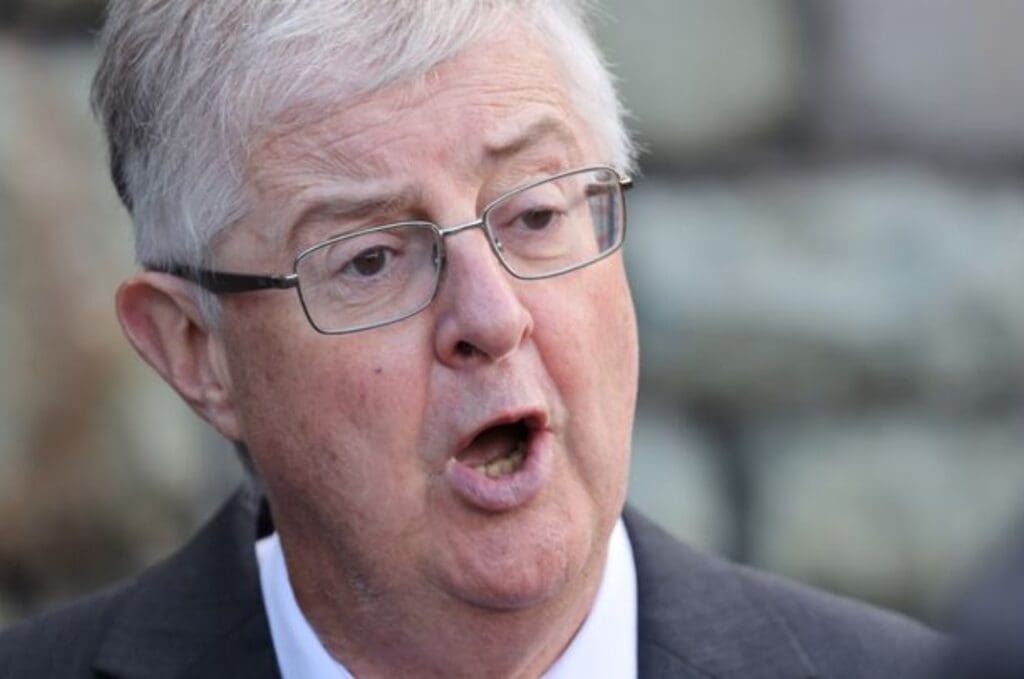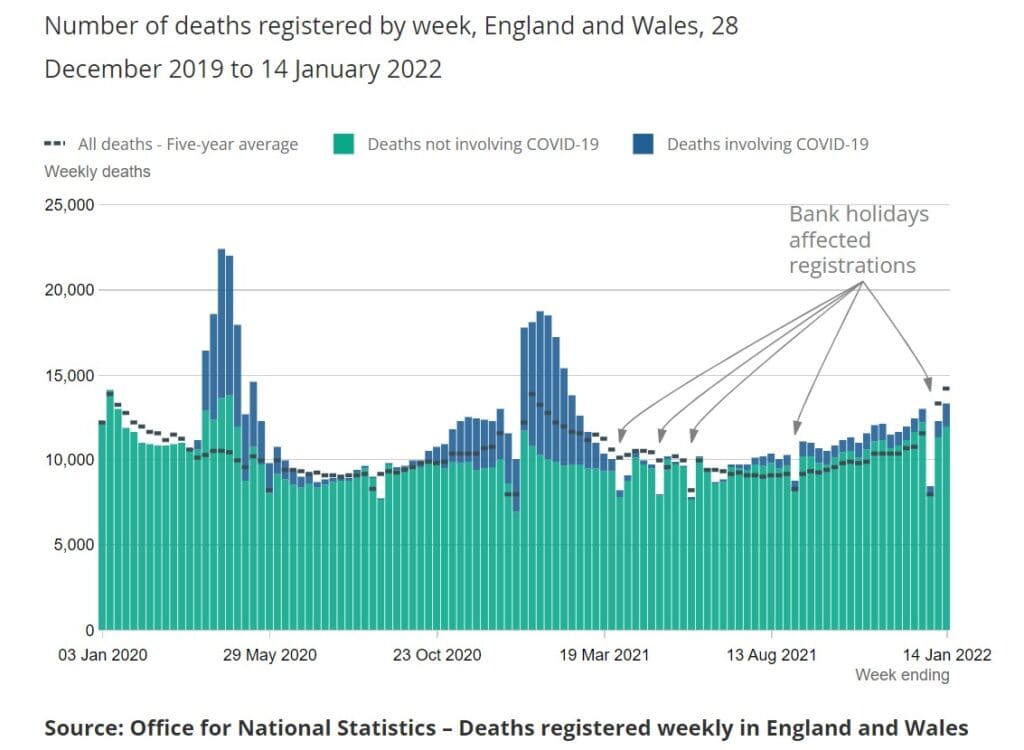

No Evidence Tougher Restrictions in Wales and Scotland Have Done Very Much, Scientists Say
The tougher Covid restrictions in Scotland and Wales over winter and throughout the pandemic may not have been worth it as there is no evidence they have “really done very much”, scientists have said. MailOnline has more.
Nicola Sturgeon is still yet to commit to a date for ending work from home guidance, despite England dumping the advice last week, while Mark Drakeford is refusing to lift the highly-controversial ‘rule of six’ for another four days.
Both nations resorted to tougher Covid curbs than England early on in the pandemic, and kept people living under economically-crippling curbs for longer.
But experts told MailOnline they could not see a “huge amount of difference” in the cumulative death rates between England and the rest of the U.K.
And they argued Omicron waves panned out similarly across the home nations, even though Downing St slipped through on relatively few rules.
This is despite Scotland cancelling New Year’s Eve celebrations and Mr Drakeford accusing England of being a “global outlier” for Boris Johnson’s gamble to adopt no extra measures. Ms Sturgeon said yesterday Scotland’s tougher festive curbs were “worth it”, arguing they kept infection rates below levels south of the border.
Latest statistics from the Department of Health show England saw the lowest Covid infection rate over the Christmas period, even though it was leading the way until December 23rd.
This is despite No 10 refusing to cave in to demands for lockdown. Instead only ‘Plan B’ was introduced, which saw work from home guidance reimposed, face masks in public places and controversial vaccine passports required for nightclubs and other large indoor venues.
SAGE advisers say the Omicron wave fizzled out on its own because of behavioural changes that led to people being more cautious, as opposed to natural immunity causing the outbreak to peak. …
Scotland was quick to impose tighter curbs in December as the nation reeled over the arrival of the Omicron variant, which policymakers feared would spark a big wave in hospitalisations.
About a week after the first case was confirmed, Scottish health chiefs started advising the public not to attend Christmas parties – unlike their counterparts in England.
And as concern over its spread ramped up, Scots were then told not to gather with more than three households and supermarkets asked to impose a one-way system in an echo of the worst of the pandemic.
Imposing ever harsher curbs, Ms Sturgeon then ordered night clubs to close for three weeks and called off public gatherings for New Year’s Eve.
Wales trod a similar path, bringing in a raft of restrictions on Boxing Day that saw sporting events played behind closed doors, the ‘rule of six’ return in pubs, cinemas and restaurants, and nightclubs shuttered.
Mr Drakeford also brought back the two-metre social distancing rule in public places and offices.
Northern Ireland closed nightclubs from December 26th and even prohibited dancing in pubs and restaurants. They also reimposed table service.
For comparison, England only went as far as ‘Plan B’ – which included making face masks compulsory in indoor public places and bringing in vaccine passports for larger venues. No10 also pivoted back to advising people to work from home wherever possible.
But ministers never went as far as calling off New Year’s Eve celebrations, or bringing back tighter Covid curbs such as the ‘rule of six’, despite calls from some quarters.
Despite evidence that the curbs had made little difference on the trajectory of the Omicron wave, some scientists said they still appeared to be worth it.
Professor Gary McLean, an immunologist at London Metropolitan University, said: “I do think it was worth it, based on the unknown factor of Omicron. It’s too easy to look back with hindsight and say England got it right.
“There was too much unknown about Omicron at the time the measures were put in place… I think England got lucky.”
Professor Paul Hunter, an infectious diseases expert at the University of East Anglia, said: “It is difficult to see any evidence that tougher restrictions in Scotland actually had an impact over and above what we were seeing in England.”
In another sign tougher restrictions were not needed, England’s cumulative Covid death rate – the total number of fatalities per 100,000 people – still trails behind that of Wales.
This is despite Wales for instance imposing a circuit-breaker lockdown in late October and bringing in the five-mile rule asking people not to travel further than this distance from their home.
Scotland has also been tougher with its Covid restrictions, keeping face masks in place on public transport for weeks longer than England, while Northern Ireland took the longest to start easing the third lockdown.
Dr Simon Clarke, a microbiologist at Reading University, said: “The different restrictions between the nations have not made a huge amount of difference (in terms of Covid deaths).
“They are all in the same ball park of deaths per capita. It does not suggest that tougher restrictions that Wales or Scotland have put in place have really done very much.”
Disappointing that SAGE is still refusing to recognise that surges naturally peak and decline owing to the development of (variant and season specific) herd immunity, rather than “behaviour change”. This is why their modelling is always wrong: they make poor assumptions and don’t learn from what actually happens. As for Professor McLean’s “England got lucky” – what is that supposed to mean, and would Prof. McLean care to point to the area of immunology this hypothesis falls under?







